Working Papers
For submission of articles or Working Papers to CEsA, please send an email to:
comunicacao@cesa.iseg.ulisboa.pt
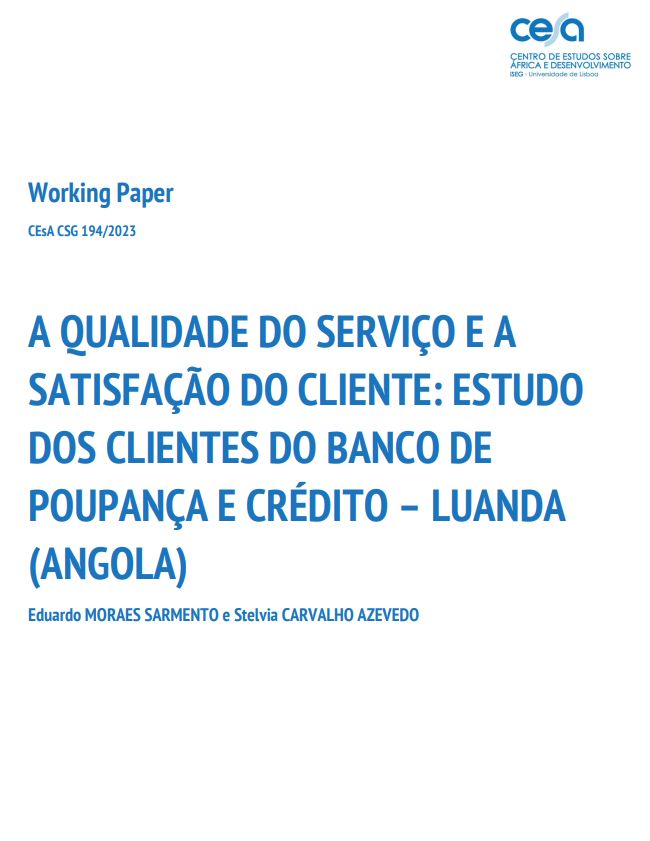
Working Paper 194/2023: A Qualidade do Serviço e a Satisfação do Cliente: Estudo dos Clientes do Banco de Poupança e Crédito – Luanda (Angola)
Abstract:
Nowadays, a correct and profitable way of managing the issue of service quality is to listen to customers, both satisfied and dissatisfied, to improve the information obtained, improve experiences with them and thus achieve greater levels of loyalty and, naturally, results. In this context, A Qualidade do Serviço e a Satisfação do Cliente: Estudo dos Clientes do Banco de Poupança e Crédito – Luanda (Angola) sought to assess the degree of customer satisfaction regarding the provision of the quality of services offered by Banco de Poupança e Crédito, located in Luanda (Angola) in order to identify the level of customer satisfaction according to the variables demographic and socioeconomic factors inherent to the SERVQUAL model and determine the correct methods and techniques for satisfaction, taking into account the elements of quality, in order to make the institution profitable. During this study, a structured interview was carried out for the Marketing and Communication Department and a questionnaire of 15 questions was applied, resulting in only 80 valid questionnaires out of 150. The same were applied during working hours to assess the quality of the service provided by the bank. From a modern company, as with the Bank, it is expected that its main objective is to provide customer satisfaction, indiscriminately needing all the company’s employees and for this it is necessary that they are satisfied to adopt attitudes consistent with this objective. However, managing these factors well to achieve positive results is an essential condition for the company to overcome the challenges.
Quotation:
Sarmento, E. M. e Azevedo, S. C. (2023). “A Qualidade do Serviço e a Satisfação do Cliente: Estudo dos Clientes do Banco de Poupança e Crédito – Luanda (Angola)”. Instituto Superior de Economia e Gestão – CEsA/CGS – Documentos de trabalho nº 194/2023
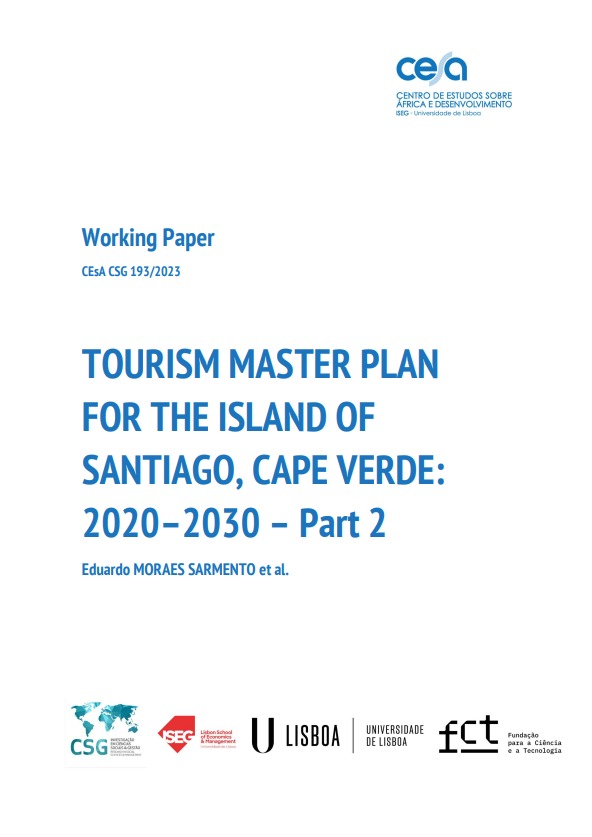
Working Paper 193/2023: Tourism Master Plan for the Island of Santiago, Cape Verde: 2020-2030 – Part 2
Abstract:
Cape Verde, a small insular development economy (SIDS), has been confronted and faces various economic, social and environmental constraints throughout its history that have been conditioning its growth strategy. In recent years, tourism has been growing and consolidating an important contribution to economic development, which is observable in the evolution of the number of nights spent in the country, revenue, number of guests, employment generation, and incentive to exports, among others. The gross added value of tourism currently has a weight that is already more than 20% of its GDP (excluding the COVID-19 pandemic period). Aware of this potential, the government created conditions for a greater use of its effects as a mobilizing factor in the economy, as reflected in various official supporting documents and strategic orientations, such as the Strategic Plan for Sustainable Development, and the Main Options of the Strategic Plan for Sustainable Development for the Tourism Activity. The Government decided that each island or region should develop its own strategic tourism plan (Masterplan). Tourism Master Plan For The Island Of Santiago, Cape Verde : 2020–2030 – Part 2 proposes several main strategic reflections about the Tourism Master Plan for the Island of Santiago in order to improve its competitiveness.
Quotation:
Sarmento, E. M. et al. (2023). “Tourism Master Plan For The Island Of Santiago, Cape Verde : 2020–2030 – Part 2”. Instituto Superior de Economia e Gestão – CEsA/CSG – Documentos de Trabalho nº 193/2023
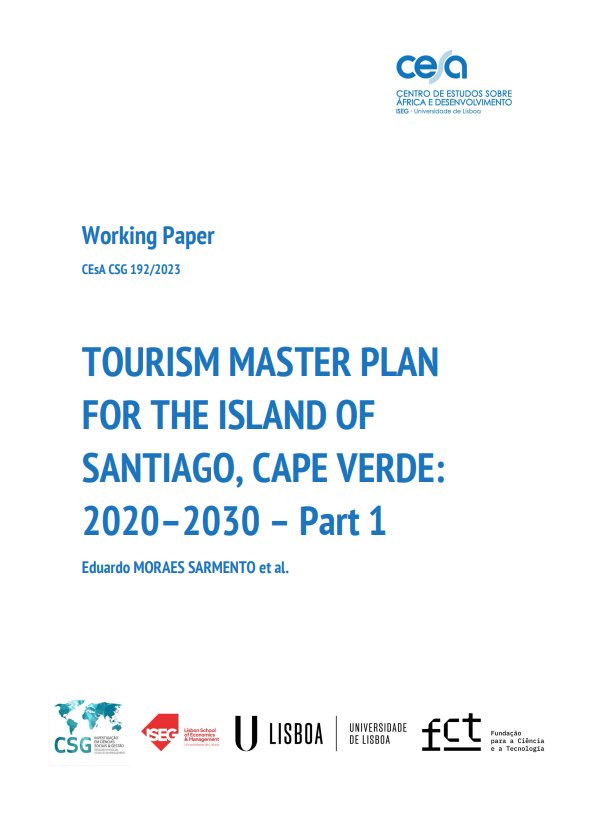
Working Paper 192/2023: Tourism Master Plan for the Island of Santiago, Cape Verde: 2020-2030 – Part 1
Abstract:
Cape Verde, a small insular development economy (SIDS), has been confronted and faces various economic, social and environmental constraints throughout its history that have been conditioning its growth strategy. In recent years, tourism has been growing and consolidating an important contribution to economic development, which is observable in the evolution of the number of nights spent in the country, revenue, number of guests, employment generation, and incentive to export among others. The gross added value of tourism currently has a weight that is already more than 20% of its GDP (excluding the COVID-19 pandemic period). Aware of this potential, the Government created conditions for a greater use of its effects as a mobilizing factor in the economy. Accordingly, various official supporting documents and strategic orientations have been approved, such as the Strategic Plan for Sustainable Development and the Main Options of the Strategic Plan for Sustainable Development for the Tourism Activity. It was also decided that each island or region should develop its own strategic tourism plan (Masterplan). Tourism Master Plan For The Island Of Santiago, Cape Verde: 2020–2030 – Part 1 integrates the main strategic reflections regarding the Tourism Master Plan for the Island of Santiago. Revenue from tourism on the Island of Santiago, where the capital of Cape Verde is located, has been much less than the values of the main islands with a high volume of tourists – Sal and Boa Vista. However, the potential of Santiago is high, and therefore it is necessary to adopt the correct measures required to transform this potential into reality. Therefore, this paper presents a short, medium and long-term vision, with a proposal for strategic objectives that will constitute the anchor on which all operational strategic and objectives that will translate into specific lines of action will be based. In summary, this document proposes a strategy based on a diversified and differentiated touristic offer from the other islands of the country, which maximises its potential, counteracting regional asymmetries and preserving the historical and intangible heritage, as well as the natural resources, with the aim for the whole population to benefit from the resultant economic development, especially the most disadvantaged.
Quotation:
Sarmento, E. M. et al. (2023). “Tourism Master Plan For The Island Of Santiago, Cape Verde: 2020–2030 – Part 1”. Instituto Superior de Economia e Gestão – CEsA/CSG – Documentos de Trabalho nº 192/2023
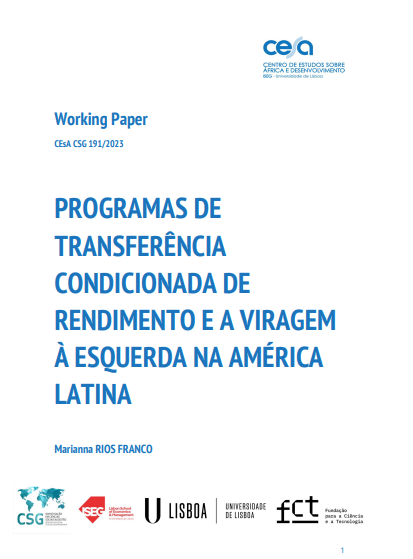
Working Paper 191/2023: Programas de transferência condicionada de rendimento e a viragem à esquerda na América Latina
Abstract:
In the last three decades, two phenomena have emerged and expanded in waves in Latin America: Conditional Cash Transfer (CCT) programs and the arrival of left-wing governments to power. This scenario is set in a historic period of economic recovery in the Region, especially with the “commodity boom”, providing the resources and political space needed to govern on the left and promote social policies. Transferência condicionada de rendimento e a viragem à esquerda na América Latina works with the research hypothesis that left-wing governments were the ones that most created, supported and expanded this type of public policy in Latin America in the period 2000-2020. Thirthy-two CCTs were mapped, implemented by 18 countries in the Region, as well as their presidents and policy guidelines. In addition to reporting on the evolution of the implementation of these policies, this work carried out a quantitative analysis based on IDB and ECLAC databases about the beginning and end of these programs, as well as the evolution of the coverage of beneficiaries. The main conclusions indicate that the hypothesis is only partially and limitedly confirmed. In short, left-wing governments achieved the highest numbers in absolute terms regarding the creation and expansion of CCTs in the region, but centrist governments achieved the highest rates of new programs and increased coverage (in relative terms) – with subtle differences in outcomes between left-wing and centrist governments. Thus, we conclude that the adoption and expansion of CCTs among Latin American countries in the last two decades was largely independent of the political orientation of the governments considered. It was, above all, a regional stake that crossed ideologies, historical moments and economic crises to redistribute income over the last 20 years to more than 100 million people.
Quotation:
Rios Franco, M. (2023). “Programas de transferência condicionada de rendimento e a viragem à esquerda na América Latina“. Instituto Superior de Economia e Gestão – CEsA/CSG – Documentos de Trabalho nº 191/2023
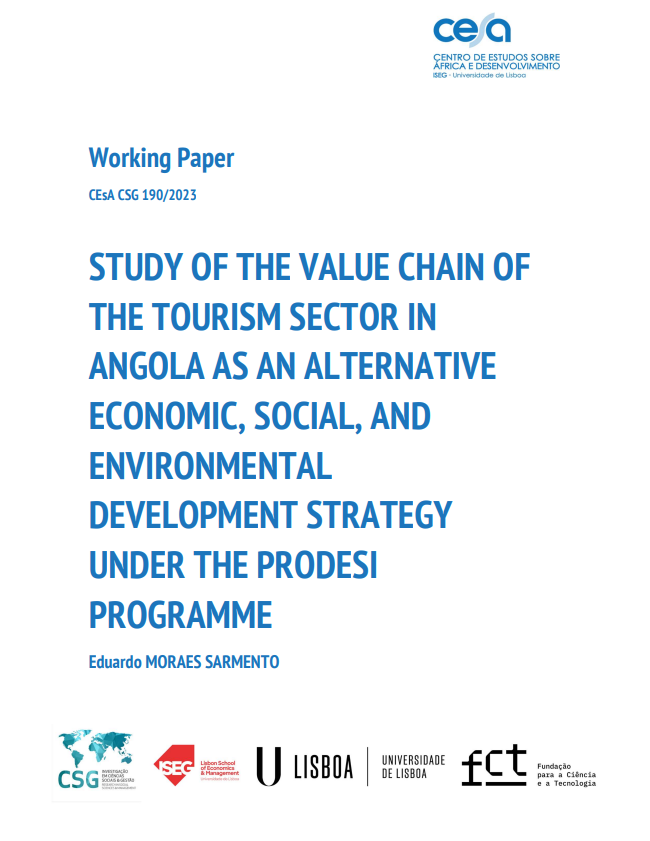
Working Paper 190/2023: Study of the value chain of the tourism sector in Angola as an alternative economic, social, and environmental development strategy under the Prodesi programme
Abstract:
Angola has been facing several economic and social problems, with one of the most important being related to the country’s long tradition of dependency on oil as a major external revenue. Due to this situation, the country’s income has been slowing and there is a need to find alternative strategies to increase the liquidity of the economy without which Angola would lack the necessary funds to increase investment and proceed with adequate policies to combat social exclusion and eradicate the flows of poverty. Aware of this situation, the government implemented the national PRODESI project, whose aim is to accelerate the process of the diversification of the nation’s economy. To this end, the project aims to promote production and exports in the non-oil sectors, as well as in sectors with a strong potential for import substitution. One of these areas is tourism, as a means of developing some of the country’s regions and provinces, and also in order to benefit populations living in worse conditions, whilst diversifying the economic restrictions. The focus of actions in PRODESI foresees that the to accelerate the diversification of the economy, whether through import substitution or through diversification and an increase in exports, will be directed towards the production of goods and services or the implementation of new strategies designed to gain critical mass and create intra and intersectoral relationships, such as in the case of tourism. Accordingly, the purpose of this research is to identify the main weaknesses of the core value chain of tourism and to propose a set of measures and recommendations to be implemented within the scope of PRODESI. The main objective is to ensure that this activity effectively contributes to diversifying Angola’s economy in a sustainable path and that it helps leverage the increase in national production in a faster and more efficient way and thus significantly help decrease the dependency on imports and increase the export basis, which can be achieved through adopting a strategy of diversification, based on both international and national tourism. 3 Methodologically, several studies were consulted and various meetings and in-depth field visits were made, between January and March 2000, in the provinces of Luanda, Malange, Huíla, and Namibe. Several interviews were carried out up until 2021with major players (ranging from ministers through to national directors and other experts) and tourist organizations (Ministries, Travel Agencies, and entrepreneurs). It is estimated that in the next 10 years Sub-Saharan Africa will register a growth in tourism superior to the global average, regardless of the COVID pandemic. Study of the Value Chain of the Tourism Sector in Angola as an Alternative Economic, Social, and Environmental Development Strategy Under the Prodesi Programme concluded that even though tourism in Angola still faces a deficit at several levels, the country nevertheless has a set of natural resources and tourism attributes that, if properly explored and used, could provide an alternative way for the future development of Angola’s society. Angola still faces residual tourism receipts from tourism activity as well as in total international incoming tourists, and therefore Angola’s national government may have a huge opportunity to implement a suitable tourism strategy (both for internal and external flows), in order to not only reinforce its importance but also to benefit the population, fight poverty, and diversify economic activities, as defined in the PRODESI strategy.
Quotation:
Sarmento, E.M. 2023. “Study of the Value Chain of the Tourism Sector in Angola as an Alternative Economic, Social, and Environmental Development Strategy Under the Prodesi Programme“. Instituto Superior de Economia e Gestão – CEsA/CSG – Documentos de Trabalho nº 190/2023
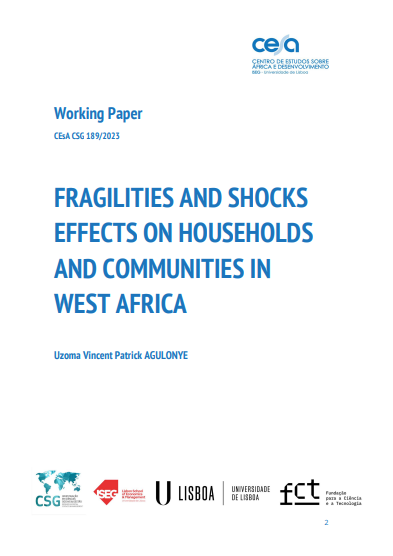
Working Paper 189/2023: Fragilities and shocks effects on households and communities in West Africa
Abstract:
Shocks are drivers of fragility yet most works on fragility in Africa use the tag “fragile state(s)” with less focus on the drivers of fragility in its institutions, states, and economies. Shocks are cardinal to the entrenchment or stability of any system. The Covid-19 pandemic revealed how fragile the world is including the “developed” or “advanced” systems. Today, households, businesses, and communities in most parts of Sub-Saharan Africa suffer the effects of a triple whammy (climate change, the pandemic and Russia/Ukraine War) including effects of history and an unfavourable global system all of which leaves them in hunger, poverty and vulnerable conditions. Fragilities and Shocks Effects on Households and Communities in West Africa used secondary sources to revisit the effects of these shocks on households, and communities in West Africa through the lens of common resources. The recent shocks effects prevalent in all these countries is higher than reported and would affect West Africa´s growing population in the foreseeable future with the absence of safety nets or effective interventions. The absence of shocks preparation in the subregion is not sustainable and adds up to the sustenance of the revolving circle of fragility in the subregion.
Quotation:
Agulonye, U.V.P. 2023. “Fragilities and Shocks Effects on Households and Communities in West Africa“. Instituto Superior de Economia e Gestão – CEsA/CSG – Documentos de Trabalho nº 189/2023
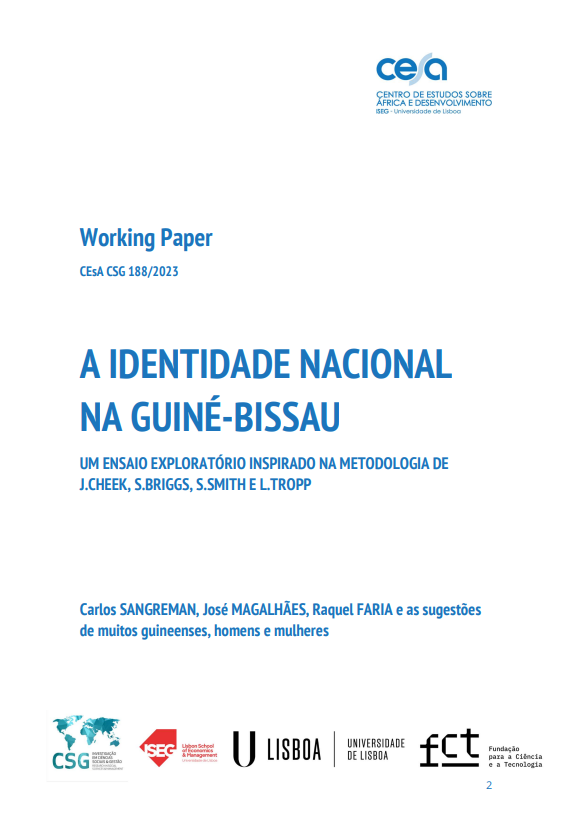
Working Paper 188/2023: A identidade nacional na Guiné-Bissau: um ensaio exploratório inspirado na metodologia de J.Cheek, S.Briggs, S.Smith e L.Tropp
Abstract:
The investigation of A Identidade Nacional na Guiné-Bissau – Um ensaio exploratório inspirado na metodologia de J.Cheek, S.Briggs, S.Smith e L.Tropp is defined as exploratory and aims to evaluate whether the methodology of inquiry and analysis of identity. created by J. Cheek, S. Briggs, S. Smith and L. Tropp, can be adapted to a fragile state like Guinea-Bissau. This methodology consists in the assessment of the importance attributed by the respondents of 70 sentences from which the characteristics of individual and social identity (family and collective) are extracted. The sentences were sent by digital means to 102 Guineans known in person or only by Facebook with request for response and dissemination and obtained 183 responses. These answers, calculated according to the methodology adopted, allowed to define some identity characteristics of the respondents. We tried to interpret these results using other surveys made since 2014 in Guinea-Bissau with different themes. It is concluded by realizing that this is a method that can contribute to the knowledge of the national identity of Guineans, but insufficient. This conclusion remains to be demonstrated if it is carried out with a statistically significant sample.
Quotation:
Sangreman, C., Magalhães, J., Faria, R. (2023). “A Identidade Nacional na Guiné-Bissau – Um ensaio exploratório inspirado na metodologia de J.Cheek, S.Briggs, S.Smith e L.Tropp“. Instituto Superior de Economia e Gestão – CEsA/CSG – Documentos de Trabalho nº 188/2023
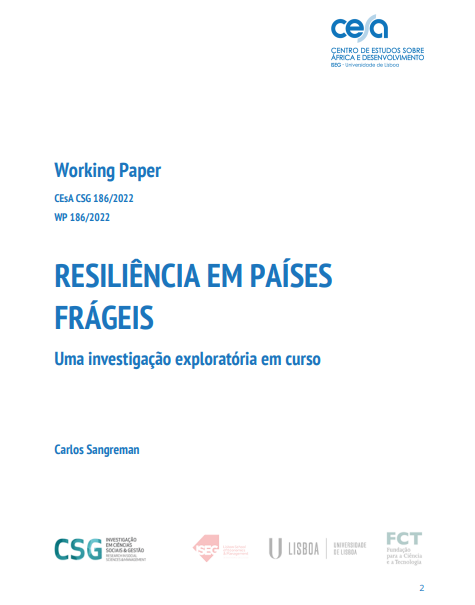
Working Paper 187/2022: Resiliência em Países Frágeis – uma investigação exploratória em curso
Abstract:
Resiliência em Países Frágeis – uma investigação exploratória em curso started in 2017 when the director of a service directorate of the Joint Research Center, at ECAS in Geneva, invited Prof. Carlos Sangreman to an exploratory study on resilience in Guinea-Bissau with the title Context specific risk perception and resilience patterns for individuals and communities (urban/non-urban) – the case of people in Guinea-Bissau. The study was carried out on the basis of the survey whose form is included in this Working Paper, gave rise to the attached article in an international journal and to a PhD thesis in progress at the University of Aveiro. The partnership between JRC and Cesa also involved Professor Alexandre Abreu and Master Jessica Santos, as well as Carlos Sangreman. From the JRC were Chistophe Quétel, Guy Bourdin and Ilektra Lemi. A survey was conducted in all regions and capital of the country to 210 households, with a previous pilot to 36 to refine the questionnaire in this partnership: project Enquêtes de terrain sur la perception du risque et la résilience des ménages en Guinée-Bissau Projet: Ares(2018)2381703 – 04/05/2018. Centre Commun de Recherche (JRC) de la Commission Européenne, Direction E, and CESA – Centre for Studies on Africa and Development of the University of Lisbon.
Quotation:
Sangreman, C., Martins, D., Quetel, C. Abreu, A. e Bourdin, G. (2022). “Resiliência em Países Frágeis – uma investigação exploratória em curso”. CEsA/CSG/ISEG/ULisboa – Documentos de Trabalho nº 186/2022
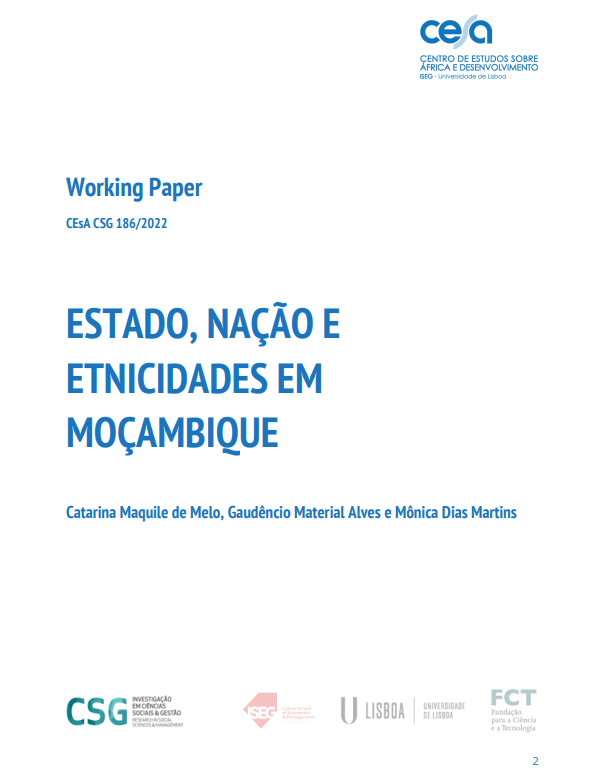
Working Paper 186/2022: Estado, Nação e Etnicidades em Moçambique
Abstract:
The processes of state and nation building begin soon after independence and establish a link between them, although each has its own logic. While the nation refers to collective identity, the State refers to the existence of a central-level political authority, respected throughout the territory. As evidenced during the text, a significant part of the State structure that emerged after national independence was the result of the Portuguese colonial legacy, idealized by FRELIMO’s ruling elite and implemented as a project of formation of the “New Man”, which occurred in an imperative way and through uniformizing policies. Estado, Nação e Etnicidades em Moçambique analyses the process of State and Nation building in Mozambique, whose population is characterised by a diversity of ethnicities. The first section presents a reflection on the foundations, the main actors and the actions towards the formation of the nation-state. In the second, we discuss the relationship between nationalism and socialist ideology, the latter interpreted in the post-independence period as the only path that would lead to development and to a society free from exploitation. With the 1990 constitution, a new order of political and economic liberalisation came into force. We seek to critically examine the political process underway in the country, in defiance of the dominant conceptions in the media, government, business and academic circles. To this end, we rely on bibliographic research and official documents, in addition to the experiences of two scholars who develop work in Quelimane, capital of Zambézia province in central Mozambique.
Quotation:
De Melo, C. M., Material Alves, G. e Martins, M. D. (2022). “Estado, Nação e Etnicidades em Moçambique”. CEsA/CSG/ISEG/ULisboa – Documentos de Trabalho nº 186/2022
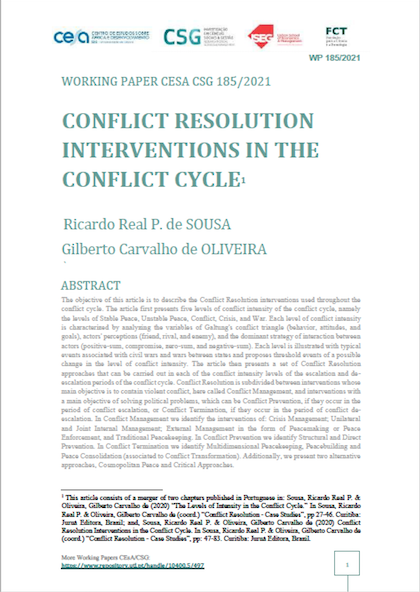
Working Paper 185/2021: Conflict Resolution Interventions in the Conflict Cycle
Abstract:
The objective of this article is to describe the Conflict Resolution interventions used throughout the conflict cycle. The article first presents five levels of conflict intensity of the conflict cycle, namely the levels of Stable Peace, Unstable Peace, Conflict, Crisis, and War. Each level of conflict intensity is characterized by analyzing the variables of Galtung’s conflict triangle (behavior, attitudes, and goals), actors’ perceptions (friend, rival, and enemy), and the dominant strategy of interaction between actors (positive-sum, compromise, zero-sum, and negative-sum). Each level is illustrated with typical events associated with civil wars and wars between states and proposes threshold events of a possible change in the level of conflict intensity. The article then presents a set of Conflict Resolution approaches that can be carried out in each of the conflict intensity levels of the escalation and de escalation periods of the conflict cycle. Conflict Resolution is subdivided between interventions whose main objective is to contain violent conflict, here called Conflict Management, and interventions with a main objective of solving political problems, which can be Conflict Prevention, if they occur in the period of conflict escalation, or Conflict Termination, if they occur in the period of conflict de escalation. In Conflict Management we identify the interventions of: Crisis Management; Unilateral and Joint Internal Management; External Management in the form of Peacemaking or Peace Enforcement, and Traditional Peacekeeping. In Conflict Prevention we identify Structural and Direct Prevention. In Conflict Termination we identify Multidimensional Peacekeeping, Peacebuilding and Peace Consolidation (associated to Conflict Transformation). Additionally, we present two alternative approaches, Cosmopolitan Peace and Critical Approaches.
Quotation:
Sousa, Ricardo Real P. de e Gilberto Carvalho de Oliveira (2021). “Conflict resolution interventions in the conflict cycle”. Instituto Superior de Economia e Gestão – CEsA/ CSG Documentos de Trabalho nº 185/2021.





